 One common complaint that I often hear people is the difficulty in understanding the Bible. Reading is easy, but understanding what they read is another story. We tell them to understand the Bible literally, but then they come across something that is obviously not to be taken literal. Then they face the many types of genres and idioms and too often give up. That’s where this book, How to Read the Bible for All Its Worth Fourth Edition, comes in. Written by Gordon D. Fee and Douglas Stuart, this book shows the reader how to know how to read the Bible.
One common complaint that I often hear people is the difficulty in understanding the Bible. Reading is easy, but understanding what they read is another story. We tell them to understand the Bible literally, but then they come across something that is obviously not to be taken literal. Then they face the many types of genres and idioms and too often give up. That’s where this book, How to Read the Bible for All Its Worth Fourth Edition, comes in. Written by Gordon D. Fee and Douglas Stuart, this book shows the reader how to know how to read the Bible.
It covers a lot of material that includes how to interpret the Bible, how to choose a translation, and how to understand a specific book based on its genre and audience. It simplifies concepts like exegesis and hermeneutics. It covers the different types of writing, such as literary, historical, narrative, parables, and idioms, and shows how to properly understand them and keep them in context. They do a great job of explaining the translation process, the types of translations, and why you need to read more than one translation.
One complaint that I have is the obvious dislike of the KJV and NKJV. They make comments that the KJV and NKJV should be avoided at all costs for serious Bible study and that virtually all modern translations are better due to older manuscripts. There is more to this issue and none of it is taken into consideration. There is a strong bias toward the 2011 NIV and against KJV. They recommend any translation with IV or SV in the title.
This is a good book with lots of good information on how to properly understand the various genres of the Bible. The biases for and against specific translations do not get in the way of the information presented. They do a great job of demonstrating proper interpretation techniques using sound principles.
Zondervan provided this book free for review. I was not required to give a positive review- only an honest review.











Randy,
When I read this book several years ago I also did not care for the strong bias against the KJV/NKJV. I recall being glad I borrowed it from the library and did not purchase it. I guess the new addition has not changed in this regard.
Personally, I have come to exactly the opposite conclusions on translations. I strongly favor bible translations derived from the Received Text so I mainly use the KJV. NKJV is a good backup. Only occationally do I consult ESV and NASB. I do not believe we have lost God’s Word in the past nor do I believe that we must continue to perfect it somehow with the so called “best” manuscripts.
John
Dear Randy:
I wish there was a magic pill one could take to render the Bible instantly clear to everyone. There are any number of aids written to make clarity of God’s Word available to all. I am not a theologian, but I will give readers of this site my advice.
There are passages of the Bible that were intended by God to remain puzzling until later times often being called ‘Sealed’ by the Bible itself. Not everything should be taken literally, this is obvious to any but the most superficial reader. The Lord himself spoke in parables lest any without the Holy Spirits guidance learn what it was about before the appropriate time. What is a student of the Bible to do?
First: Read your Bible! There are translators notes, cross references, dictionaries, and various appendices which used industriously comparing passage against passage will remove most of the confusion.
Second: Read your Bible! One cannot expect to understand the Bible with only a 15-30 minute devotional every day. Actually there are many, if not most who do only that, and then expect to understand this most wonderful and complex book completely.
Third: Read your Bible: Have a well thought out plan of reading. There is a tremendous amount to learn, it requires some organization.
Fourth: Read your Bible: Establish a proper frame of mind before even opening the cover, this includes asking for God’s Holy Spirit for guidance, and I’m not saying just a brief prayer of a sentence or so, though that is better than not praying for guidance at all.
Fifth: Read your Bible! Read your Bible and if necessary consult commentaries and other helps like, How to Read Your Bible For All its worth.
Sixth: Read Your Bible! Your Bible is God’s Holy Word sent to you personally! You cannot expect to comprehend all the various levels of meaning without seriously delving into it.
There are only one, perhaps two translations that should be avoided, I’ll not mention them, there are reviews and scholarly articles published by various Bible Societies, Foundations, and other sources that critique these matters, read them, then make your choice based on perceived truth and your personal needs. I prefer the Authorised (KVJ) myself, but respect several other translations. Choose for your self which one works best for you, making note of each translation’s strength and weaknesses.
After you have done your “Homework” Read your bible, it takes time and effort. God will reward you for your reading, after all that is why he gave us His Holy Bible, read it!
Your in Christ
Don Denison
John, your right how does one improve upon what Jesus has done for each and every one of us. It’s not so much about the printed word, since the Jews have had the Law since Moses gave it to them. However, according to the Apostle Paul the Promise of Christ predates the Law of Moses. With that said, the modern translations do not improve upon the Gospel, but neither did and nor does the King James. Hebrews 12:1-3
Hi Norm,
I agree, the gospel message is clear in both new and old english translations.
John